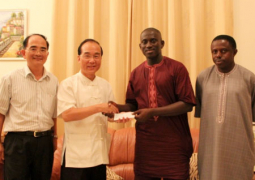As the groundnut trade season officially opens, the National Farmers’ Platform of The Gambia has disbursed equipment and machines worth over D76, 000 to Kombo South Groundnut Farmers to enhance their income-generating capacities through micro-processing of their produce into groundnut paste.
The first farmer organization to benefit from what the platform calls a “new dimension for farmers to derive more income from their produce”, is the Kombo South Groundnut Farmers.
They received the boosts from the National farmers Platform of The Gambia on Thursday in Gunjur, where representatives from nine farmer organisations were represented by their executive committee members.
The equipment include a high voltage power-tiller generator, two nut-cracking machines, two groundnut rusting machines, two grinding machines that turn the roasted nuts into groundnut paste, buckets with lids, pans and sieving baskets.
Addressing the farmers at the presentation ceremony in Gunjur, the national coordinator of the platform, Marie Adams, described the event as another milestone in the life and work of groundnut farmers, particularly those of Kombo South.
Mrs Adams said Gunjur cluster has been singled out as the first recipient of this project as a grant to them through the support of VECO International, as a result of their recorded sustainable management of a project in 2008.
However, she warns that the project is not meant for individual benefit but the organization.
She also urged them to discuss and strategize on how to manage the equipment to ensure success and sustenance of the project. The role of the national farmers’ platform, she adds, is confined to identifying farmers’ challenges and problems and accessing donor or government support or help towards alleviating the problems and providing solutions.
She therefore calls for transparency and wider consultations in the operation and management of the projects.
She explained how the business of processed groundnut paste can add value to farmers’ products, citing as an example a tin of groundnut paste that costs D250 per tin. A farmer can derive ten tins of that from a bag of groundnut that would cost D800 when decorticated, she says. “You will realize that with these equipment at your disposal, you can be able to earn twice of what you earn from decorticated bag. I have the confidence that you can be able to live up to expectations as you did in the past,” she said, urging them to make the best use of the grant as many other farmer organizations are not fortunate to benefit from such offers.
The president of the National Farmers’ Platform, Musa Jawneh, reminded the farmers about the seed bank grant that was received from the European Union in 2008 following the drought that hit the Western and North Bank Regions that year. Government spends up to D25 million on seeds distribution each year, he says, adding that it should be the responsibility of farmers to wisely manage and sustain any such grants from government to ensure future benefits without cost to government or donors.
“What government or donors give you [farmers] cannot salvage you from poverty… neither could it give you much dividend. It is meant to enhance your capabilities to do better at what you do in farming, and the returns should take into consideration the seed bank as your source of seeds for sowing. If that is done, you will cut down the cost of government spending on seeds while ensuring your own security for future seasons,” he told farmers.
He says it has become a policy of donors to let aid beneficiaries give account of the use of aid before other aid requests are considered or given.
He said the Kombo South farmers benefitted from the one just given out because they managed the previous aid well among several beneficiary organizations, “which qualifies them for more”.
He says farmer organizations in neighboring
Government policy is to empower farmers through policies, inputs and skills to help in lifting them out of poverty through diversifying and mechanizing production, processing into value added goods, he says.
Alhagie Mboge, an executive member of the National Farmers Platform, underscored the need for commitment on the side of regional and district platforms towards their membership.
He says the platform is not a financing agency and can only amplify the plights of farmers’ organizations to government and donors.
However, he said, the projects brought to them should be wisely managed to ensure sustenance.


